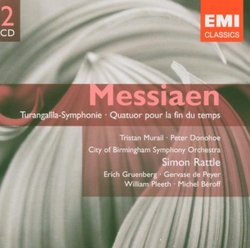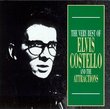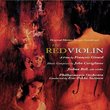| All Artists: Olivier Messiaen, Simon Rattle, City of Birmingham Symphony Orchestra, Aloys Kontarsky, Michel Beroff, Peter Donohoe Title: Olivier Messiaen: Turangal�la-Symphonie; Quatuor pour la fin du temps Members Wishing: 0 Total Copies: 0 Label: EMI Classics Release Date: 5/24/2005 Genre: Classical Styles: Chamber Music, Forms & Genres, Concertos, Instruments, Keyboard, Reeds & Winds, Symphonies Number of Discs: 2 SwapaCD Credits: 2 UPC: 724358652529 |
Search - Olivier Messiaen, Simon Rattle, City of Birmingham Symphony Orchestra :: Olivier Messiaen: Turangal�la-Symphonie; Quatuor pour la fin du temps
 | Olivier Messiaen, Simon Rattle, City of Birmingham Symphony Orchestra Olivier Messiaen: Turangal�la-Symphonie; Quatuor pour la fin du temps Genre: Classical
|
Larger Image |
CD DetailsSimilarly Requested CDs |
CD ReviewsFORMIDABLE DAVID BRYSON | Glossop Derbyshire England | 07/02/2005 (5 out of 5 stars) "Most surprising, I should say, that this account of Turangalila should be receiving its first notice here only now. In his more recent eminence as chief conductor of the Berlin Philharmonic Rattle has received high praise, and rightly so, for his recording of Messiaen's Eclairs sur l'Au-dela. However it was through his work with the City of Birmingham Symphony that Rattle first came to international notice for sheer and simple genius, and this performance will go a long way to showing why. Rattle has Messiaen's style to perfection, and he is joined in this 1986 recording by Peter Donohoe, greatly under-recognised in my own opinion, as a completely exemplary piano soloist. The piano part is very difficult and the composer himself made references to the work as a `piano concerto', which I think a slight exaggeration. What it really is is a symphony with piano obbligato, a description first coined for the Brahms D minor. The description fits Turangalila much better, but Brahms's grim masterpiece came to mind shortly after the start with some memorable martellato trills from the soloist. Otherwise there is nothing grim about Turangalila, which is a huge upbeat masterpiece like Mahler's 8th, and one that can be mentioned in the same breath so far as I am concerned. The title is apparently Sanskrit (how's that for one-upmanship?) and means something like `play of time'. Its theme is love, ordinary human love and not something with a divine dimension except insofar as it is set against a background of eternity, as is everything that the deeply spiritual Messiaen ever did. In terms of how it deals with its theme it fits Beethoven's description of his own Pastoral Symphony very well `more expression of feeling than depiction' - it would be easy to recognise the movements called `Joy of the blood of the stars' and `Garden of love's repose', but I imagine it would be anyone's guess which of the remainder are the 3 Turangalila movements, which are the 2 love-songs and which is about the `development of love' if we had not been told. As usual, the expression is extrovert, perhaps a little kitsch and probably more than a little self-indulgent. I have no complaint with any of that, as this is a composer I take to in a big way without sharing a shred of his religious belief. His grasp of orchestral sound, for one thing, is simply colossal, he can carry off demotic effects that would have made Ravel or Delius hesitate, and Rattle is exactly the man to put it all across to us. One thing conspicuous by its absence from this score is Messiaen's beloved birdsong effects, but music lovers bored with Holst's Jupiter may find, as I do, the Joie du sang des etoiles something more to their taste. There is also a performance here of the Quartet for the End of Time that would have had me buying this disc for just on its own. It rivals the famous Tashi account and in fact predates it by several years. It is a more emotional and forceful account than Tashi's, which may or may not be how you like it done, but by any standard it is a superb one. As a final filler there is a 6-minute flute and piano duo called The Blackbird. In this let me reassure you that it's not actually William Pleeth, great cellist though he is, who has taken up the flute, but Karlheinz Zoller. The blackbird's song, when he takes up his recital-position at the end of a branch or at the corner of a rooftop, is one of the most varied in the whole avian kingdom as well as one of the loveliest. What I don't hear in this representation is the familiar `tweety oodle-doodle peep: twit twit twit twit twit' that I know from my local virtuoso, but Messiaen knew birdsong better than I have ever done. The recordings, respectively from 1986, 1971 and 1968 are very good, if not quite up to the superlative standard of the same conductor's more recent Eclairs, but any music-lovers worried about that are just too fussy I should say. This is a superlative set, and it's high time someone said so." Uninspired Performance of Turangalila Scriabinmahler | UK | 03/02/2008 (3 out of 5 stars) "
Rattle's rendition of Turangalila is just fine, but not the outstanding either. Basically. He ticks all boxes, as he always does. I get an impression that he is always in control in every detail, and manages to kill music itself just as it happened to his two over-rated recordings of Mahler 10th. He completely fails to capture the primeval force and violence of the music by his control-freak approach. Peter Donahoe's playing is often drwoned in louder sections and not poewrful enough to penetrate the thick orchestration (Remember this work is piano concerto as well as orchestral). If you are after really powerful and inspired performance, try Antoni Wit's Naxos recording." |

 Track Listings (8) - Disc #1
Track Listings (8) - Disc #1
